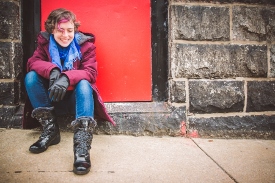
Almost Anything
Contributor’s Marginalia: Sarah Blake on “Coupling” by Hilary Jacqmin
I love poems that play with a reader’s expectations.
I’m reminded of Donald Barthelme’s “The School” when I read Hilary S. Jacqmin’s “Coupling.” In what might be the sweet, innocent setting of two people who have just moved in together, there is a butcher block “spiked…with knives” and a hyacinth the color of a bruise that “die[s] within a week.” There are fights and Jewish law is broken. Where will this go? Will it end with sex like “The School” almost does? Is a gerbil about to enter? Or were those details foreshadowing a death, a murder? Are we coming to a moment that’s sacrosanct or sacrilegious?
The quiet build, the laying out of specifics, allows for almost anything. What will the poet do when the poet can do anything? This is how the reader comes to the last stanza. The first line has “hands pal[ing] with salt,” how hands might pale in death. But from onion rings! Of all things. I’m not sure there can be lighter fare for a poem than onion rings. They’re downright playful. So this is the most death we will get, these paling hands. I’m at least sure of that at this point. But still I’m not sure what’s to come. Sex is definitely still a possibility.
And then the poem ends with: “the windows cast / an iceberg on our bedroom wall.” Wooooo. What an opening up. An expanse. It’s not sex but it takes place in the bedroom. It’s not death but an iceberg doesn’t exactly suggest life. There is hopelessness and hope in that image. Even if the hope is only that they are still together to see the iceberg, to be getting drunk and eating onion rings, together. And isn’t the beginning of something always difficult? It doesn’t mean things can’t still end well.
As a reader, I’m not sure if I should be hoping things go well from here or not for this couple. But that doesn’t bother me—it actually frees me from considering their future at all. Instead I think of them inside this moment. I relish this moment, creepy and stark. And mostly I’m enjoying it, taking my time in it, because I never could have imagined the poem arriving here myself. I needed the poet for that. She built my expectations and tempered them, met them, and then broke the poem open over them, and tonight I’ll be imagining icebergs on my walls.
